|
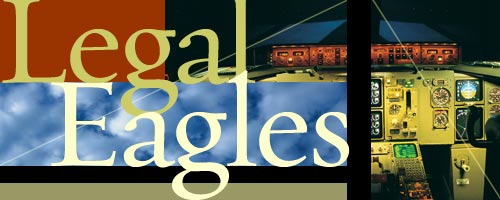
By Kathleen Kocks
This December, the aviation industry arrives at a significant milestone: Its centennial anniversary. On Dec. 17, 1903, at Kitty Hawk, N.C., Orville and Wilbur Wright flew a fragile, yet controllable and powered airplane. The event lasted a scant 12 seconds and traveled a mere 120 feet, but it launched the aviation age and bestowed international acclaim upon the two men.
The aviation industry’s scope is extraordinary. It includes nearly 900 airlines flying in excess of 20,000 airliners worldwide—transporting last year nearly 1.7 billion passengers and 30 million tons of freight. Also included are more than 275,000 aircraft flown by private owners or by aircraft operators who are not airlines per se but do provide a variety of ad-hoc flight services, like aerial photography. There are also tens of thousands of airports worldwide and a globe-spanning air traffic control system. Aircraft are manufactured in more than 60 countries, and untold thousands of companies produce aircraft parts and products.
Legal Labyrinth
This milieu generates a universe of legal issues. A primary one is government regulations. Despite economic deregulation of many airlines, governments regulate aviation in other areas. In the United States, the Department of Transportation and Federal Aviation Administration heavily govern licensing of aircraft operations and personnel; aircraft design, maintenance, airworthiness, and safety; and more.
Other U.S. agencies holding particular sway over aviation include the National Transportation Safety Board (accident investigations/safety), Department of Justice (antitrust/competition), Department of Labor (enforcing the Railway Labor Act of 1926) and the newest players: the Transportation Security Administration and the Department of Homeland Security.
Aviation companies must also negotiate with local government agencies for land facilities, opening a nest of administrative law and government-contracting challenges. Other areas requiring legal skills include: aircraft acquisition/financing, airport security/access, international operations, insurance, liability and lawsuits, aviation-specific taxes, and labor unions and benefits.
A legal career in aviation requires multifaceted preparation. Ten GW alumni, working in different aviation areas, agreed to share their perspectives on their work and provide advice on what it takes to be a lawyer in aviation.
Douglas M. Steenland, JD ’76
President
Northwest Airlines
Douglas Steenland is the president of Northwest Airlines and a member of its board of directors. His career in aviation began upon graduation from GW Law School when he was accepted into the DOT’s Honors Attorney Program, which is offered to well-qualified, recent law school graduates. He spent four months working at the FAA and four months in the Office of the General Counsel for the secretary of the DOT. At the end of the year, Steenland was hired as a lawyer in the Office of the General Counsel, where he focused on aviation matters.
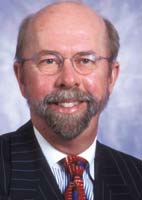 |
|
Douglas M. Steenland
|
“It was an exciting time in aviation, because the Congress and the Civil Aeronautics Board were debating airline deregulation,” he says. “The DOT was an active player in that debate, and I had a chance to participate in the biggest policy debate on how the airline industry should be structured.”
After spending two years at DOT, Steenland joined Washington firm Verner, Liipfert, Bernhard, McPherson & Hand. The firm had a large transportation regulatory practice, and Steenland’s focus included work for airlines, particularly Pan American World Airways. Projects included Pan Am’s acquisition of National Airlines and initiation of operations to China after air service reopened between the United States and China.
“In 1989, when Northwest Airlines was the subject of a leveraged buyout, we represented the buyout group on Washington, D.C., matters, and then in 1991, after working for the ‘new’ Northwest, I was recruited be part of the management team here in Minneapolis,” Steenland says.
|
“I can honestly say I’ve never had a dull day, and every day your intellectual resources get a very, very healthy workout.”
— Douglas M. Steenland, JD ’76, Northwest Airlines
|
Hired as vice president/deputy general counsel, Steenland was immersed in the strategic planning and long-term strategies at Northwest. Promotions came quickly: senior vice president/general counsel (1994); executive vice president/general counsel and alliances (1998); executive vice president/chief corporate officer (1999); and president and board member (2001).
“Aviation and the airlines always struck me as an interesting business, and the more exposure I got to it, the more complex and challenging the issues became, and the more attractive aviation became,” he says.
“The legal issues that are front and center in the airline industry today are the challenges that airlines face in this overall economic environment, where revenues are down and the focus needs to be on adjusting our cost structure to bring it in line with the new revenue-generating expectations.”
It involves constant review of their cost inputs and ways to conduct business more efficiently and productively, he says. “Since the biggest input is the wages, salaries, and benefits line, this puts a lot of attention on working with our employees in knowing what we need to do to survive in the long term.”
A second element, he says, is regular contact with Congress and other government bodies to discuss the myriad issues they encounter. “Whether we are talking about airport security, pension funding, or regulatory issues, they all have a big impact on the industry’s success, and they require a lot of attention.”
A third issue is assuring a good base of operation, which includes adding partnerships to expand Northwest’s network. “We are now implementing an alliance agreement with Delta Airlines that is a business relationship and is embodied in a contract, which required an intensive regulatory review to get completed.”
Not surprised that many people in senior management at airlines have legal backgrounds, Steenland points to two key benefits. “First, it is a training and core competency that helps you be fully equipped to set the airline’s strategy and engage in the decisionmaking processes.”
Many issues that are critical to the enterprise’s future have significant legal or regulatory components, he says. “A legal background helps you fully appreciate the interplay between the airlines and government policymakers, between an airline and its employees that are represented by collective bargaining, and to understand the competitive dynamics in the industry.”
“Second is the process that a law school and a legal career teach to conduct fact-gathering—building a record, making a case, then applying a set of rules.” It’s a matter of taking large amounts of information and distilling it down to the relative components of what is material and what is not material, he says.
Asked for advice to others eyeballing a career in aviation, Steenland responds, “The airline industry is subject to more external variables than many other businesses—whether it is economic recession, 9/11, SARS, the Iraqi war, currency changes, oil prices, and more,” he says. “I can honestly say I’ve never had a dull day, and every day your intellectual resources get a very, very healthy workout.”
Ron Ricks, JD ’76
Vice President of Governmental Affairs
Southwest Airlines
Ron Ricks describes his path into aviation as “circuitous.” It began after he graduated from the University of Texas in 1972 and moved to Washington, D.C., to work as a legislative assistant to Congressman O.C. Fisher (D-Texas).
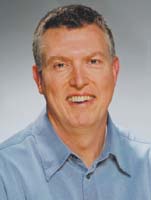 |
|
Ron Ricks
|
Ricks wanted to continue his education, so he picked GW Law School. He was able to work during the day and attend classes at night. After graduation, Ricks became a partner in a small, general practice firm in New Mexico. He chuckles that his first paid work was a barking dog case, literally and figuratively.
“But one great thing about a small firm is that you get to handle everything yourself,” Ricks says. As the only attorney or one of two attorneys on a case, he gained hands-on experience in several areas, including litigation, administrative, regulatory, and other matters.
“You learn quickly how to work with other lawyers, judges, courthouse staff, etc. As a young lawyer in a small firm, you can’t be too selective; you take what comes in and figure out how to handle it.”
The experience paid off in 1981, when Ricks joined Oppenheimer, Rosenberg, Kelleher & Wheatley Inc., of San Antonio, Texas. “Kelleher” is Herbert D. Kelleher, who together with Texas businessman Rollin King, launched Southwest Airlines in 1971.
“I purposely sought out a job with Kelleher, because he was an accomplished lawyer and entrepreneur. I also wanted to be associated with him to do work for Southwest Airlines. He hired me because I had just the general legal experience he was seeking,” Ricks says. “Kelleher took a chance on me and it turned out to be a career.”
Working the Southwest account was immediately exciting. In 1981, President Reagan fired ATC controllers who had gone on strike, throwing the airline industry into chaos. Meanwhile, Southwest’s president/CEO, CFO, and advertising firm left the airline to join Southwest’s principal competitor.
“So, Mr. Kelleher, then Southwest’s chairman, left the law firm to also take over Southwest’s president/CEO positions. He left me and another lawyer, Jim Parker—Southwest’s CEO now—to do most of the legal work for Southwest,” Ricks relates. “And because the airline deregulation act was coming into play, Southwest began a rapid growth plan.”
Southwest grew quickly and by 1986 needed more legal bench depth. The airline hired Parker as general counsel and hired Ricks to create a governmental affairs department.
Ricks now serves as vice president of governmental affairs and serves on Southwest’s executive planning committee and executive officer group. He oversees governmental and public affairs for the airline’s 58-city, 30-state route structure, and in Washington, D.C.
“In terms of my job’s legal challenges and issues, it’s hard to summarize because there are so many. Prior to 9/11, it would be fair to say I spent a lot of my time on competitive issues, antitrust law, trade regulation, administrative law, and grievances involving the various federal regulatory agencies, in addition to legislative lobbying at the federal state and local levels,” Ricks says.
“But since 9/11, the airlines are faced with the daunting task of complying with hundreds of new federal requirements. These issues have recast my job’s focus. The implementation of new security procedures and systems have created a host of issues—not the least of which is working with the federal government to ensure security of our customers and employees while also addressing somewhat conflicting needs of passengers’ rights and civil liberties. All this must be done while trying to rebuild customer demand and reduce operating costs.”
Asked how to prepare for a legal career in aviation, Ricks mentions the importance of being able to work with governments on airport issues involving real estate and local taxation. “Airlines are confronted with a tremendous range of issues—at local, federal and international levels—that are not directly related to running an airline,” he says.
Ricks says the reason he was hired was not because of specific training in aviation—instead it was his breadth of experience in various legal fields. “It also helps to have a genuine interest, indeed a passion, for the business itself.”
Paul Stephen Dempsey, LLM ’78
Director, Institute of Air & Space Law
McGill University, Montreal, Canada
Dempsey, the Tomlinson Professor of Global Governance in Air & Space Law at McGill University in Montreal, also is vice chairman/director of Frontier Airlines and director of the Jordan Centre for Aviation Security and Safety at Queen Noor Civil Aviation Technical College.
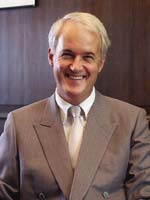 |
|
Paul Stephen Dempsey
Photo by: Claire Duggan
|
In addition, Dempsey is the author of more than 70 published articles and books, editor of various law journals, frequent speaker at international aviation symposiums, and expert guest on national television and radio. From 1986 through 1998, he hosted a weekly talk show, “Your Right to Say It,” on Denver’s KWGN-TV.
“Aviation is inherently intriguing—the whole business of defying gravity—and the legal rules are quite interesting. Particularly the liability issues, because when things go awry, they can become catastrophic,” Dempsey says.
Dempsey ended up in aviation after obtaining his JD from the University of Georgia in 1975. “I had a ‘Kennedy-esque’ view that I could go to Washington, D.C., to serve my country,” he says. “I took a job at the Interstate Commerce Commission, which was then heavily regulating railroads, trucks, and buses. After a few years there, I went to the Civil Aeronautics Board where we were deregulating airlines.”
He also started working on an LLM in the evenings at GW. When he finished, he moved into teaching. From 1979 to 2002, Dempsey directed the transportation law program at the University of Denver. From 1999 to 2002, he also was director of the National Center for Intermodal Transportation, a DOT-sponsored research partnership between the University of Denver and Mississippi State University.
|
“Aviation is inherently intriguing—the whole business of defying gravity—and the legal rules are quite interesting.”
— Paul Stephen Dempsey, LLM ’78, Institute of Air & Space Law, McGill University
|
And he is now at McGill in Canada. “Founded in 1951, it has a distinctly international student body and focus of study,” he says. “We have graduate students pursuing their LLM and Doctor of Civil Laws degrees, and graduates working in government, law firms and major airlines in 120 countries worldwide.”
Asked about today’s legal aviation issues, Dempsey’s answers have an international air. One issue, he says, is the Montreal Convention of 1999, which updates the rules of international aviation liability. “Beginning in 1929 and particularly after creation in 1994 of the International Civil Aviation Organization, the world aviation community came together and promulgated uniform rules of safety and liability to facilitate aviation worldwide. The United States recently ratified the Montreal Convention of 1999, giving it the ratifications required to go into force,” he says.
“We also have new liberalization initiatives from the European Union, which told its member states that they are not to individually negotiate bilateral aviation agreements. The EU plans to negotiate these, as well as a whole new open skies agreement.”
Another factor is the economy, he says, which brings up issues of labor and bankruptcy law. He also cites that a U.S. federal court judge has ruled that the estates of families having a decedent or someone injured by September 11 can bring litigation against the airlines involved.
And then there is his own piece of the industry: Frontier Airlines.
“We started Frontier Airlines in 1994 because there was no low-cost carrier in Denver. We began with five old Boeing 737s that originally belonged to Piedmont Airlines and we flew to cities in North Dakota and Montana.
“In 1996 and 1997, United engaged in a predatory attack on Frontier, and I led the counterassault, going to the Congress, DOT, Department of Justice and the press. We were successful in persuading United to abort their practices.
“Today, Frontier flies 38 aircraft to about 40 cities from Denver, and we recently resumed profitability. It’s been an enjoyable and interesting experience.”
Asked about the upside of working in the aviation industry, he says, “If someone enjoys a challenge, the aviation field is one with an abundance. It is also an international industry that shrinks the planet and brings people together. You could say it is the glue that binds the world economy together.”
Bruce York, JD ’80
Director of Representation
Air Line Pilots Association
Founded in 1931 and chartered by the AFL-CIO, the Air Line Pilots Association represents 55,000 airline pilots at 46 U.S. and Canadian airlines. It provides traditional union representation and lobbying, and devotes 20 percent of its dues income to support aviation safety.
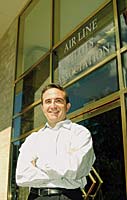 |
|
Bruce York
Photo by: Claire Duggan
|
Given the current airline economy and the increased security issues since September 11, York is very busy these days. Things were calmer when his career in aviation started—as a summer law clerk at ALPA after his second year in law school. The job’s aviation aspects were appealing, but more so the labor aspects.
“I had an interest in labor issues from a pretty young age, although not on the labor side per se. My grandfather was a Russian immigrant who started working as a truck driver, then started his own trucking business whose drivers were represented by the Teamsters,” York explains.
His ALPA job continued part time during his third year and became full time after he finished law school and passed the bar. Assigned to ALPA’s representation department as a staff attorney, York worked the “nuts and bolts” of labor relations—collective bargaining, grievance/arbitration work and organizing. In 1985, he was promoted to supervisor of representation. In 1990, York left ALPA for the entertainment and broadcasting world to become national executive director of the American Federation of Television and Radio Artists, but he returned in 2000 to his current position.
The scope of work in aviation is always broad and interesting, he says. “There are currently a number of issues concerning the law that governs labor relations in the airline business—the Railway Labor Act—and it has been the subject of congressional review. Moreover, the economic structure of the industry has led to a much changed framework of longer contracts,” he explains.
“The current environment also presents issues related to the introduction of smaller jets and managements’ desire for lower pay rates for pilots; mergers and acquisitions with other airlines and the impact on a pilot’s seniority; and new Homeland Security regulations and how the power to investigate the background of pilots inter-relates with collective bargaining agreements that provide for due process before termination can occur. Other new issues with labor implications include access to cockpits and permitting pilots to carry handguns,” York says.
“In addition to contract negotiations, ALPA’s Representation Department attorneys regularly represent pilots when the FAA takes action against their competency and medical certificates. Along with NTSB accident investigations, these are often very technical safety, medical, or administrative law and advocacy cases.”
Another issue ALPA is addressing concerns pension reform and ERISA, York mentions. Under economic duress, airlines are seeking ways to cut pension costs. At the same time, pilots approaching retirement are seeing efforts to cut the pensions they expected to receive. ALPA’s Retirement and Insurance Department, headed by Managing Attorney Elizabeth Koby, JD ’80, is spearheading work on this issue.
“I really consider myself much more of a labor lawyer than an aviation lawyer,” York says. “And that’s what aviation is like; it’s filled with a bunch of subspecialties, whether in labor, regulatory, accident, corporate or transactional work, and more. To anyone wanting to work in aviation, I would recommend getting a multifaceted background. It’s just impossible to predict which of aviation’s subspecialties may provide opportunities.”
David T. Hunter, JD ’82
Lane Powell Spears Lubersky
Seattle
A partner at Lane Powell Spears Lubersky, David T. Hunter brings a different perspective to aviation law, because he was in aviation before law. His training began with a bachelor’s degree in aerospace engineering from the U.S. Naval Academy in 1970, then a master’s in aerospace engineering from Georgia Institute of Technology (as a Guggenheim Fellow). He entered Navy flight training, where he earned his wings and a master’s in aeronautical systems from the University of West Florida. He served as an A-7E Corsair pilot, then as an experimental test pilot at Patuxent River, Md. He also was a finalist for NASA’s space shuttle pilot selection in 1977 (the youngest of 25 finalists; 15 were selected).
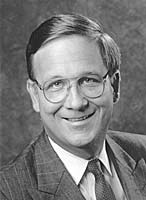 |
|
David T. Hunter
|
In 1979, while at Patuxent River and awaiting assignment as a deputy program manager in airborne weapons acquisition at the Naval Air Systems Command in Crystal City, Va., Hunter began thinking about leaving the military. That’s when he met Robert M. Smiley, then a prominent Washington, D.C., aviation attorney.
“During a lunch meeting, Bob explained aviation law and what he was doing. The idea of becoming a lawyer intrigued me,” Hunter says.
He started law school in fall 1979, working days at NavAir and going nights to GW. In January 1981, he resigned his naval commission and switched to GW full time during the day.
“I was fortunate to take aviation law under Paul Dembling [chief author of the National Aeronautics and Space Act of 1958 and NASA’s first general counsel] and maritime law from Professor. David J. Sharpe, a nationally recognized authority,” Hunter says. “And I was working as a law clerk for Bob Smiley, giving me an exposure to a variety of aviation cases.”
After completing law school, Hunter moved to Seattle, because of its significant maritime and aviation business activities, and accepted a job with Lane Powell.
“Aviation is a fairly broad-based legal field, and about the only legal area I don’t do is taxation,” he says. “We do basically everything that has do to with aviation defense, and I only become a plaintiff when I’m representing an insurer with a subrogation claim,” Hunter says.
He has represented passenger and cargo airlines, small airplane owners and operators, airports authorities for incidents at their facilities, airplane manufacturers for product liability and patent matters, and pilots accused of flight violations.
“Our office also does airplane transactional work, and I sometimes get into that business, which primarily involves contract law,” he says. “We have done a lot of work on the new concept of fractional aircraft ownership, where a number of individuals own shares in a single airplane.”
Other work areas include product liability, which often involves aviation engineering issues, and tort law, involving negligence culpability and damages. “We also get involved in cases involving the Warsaw Convention and other international treaties, such as representing international airlines on a cargo claim.”
While some lawyers have found an aviation background isn’t necessary to their success in the field, Hunter has the opposite view.
“In my work, having an aviation background has been indispensable. It put me far ahead of the crowd to be able to immediately go into a product liability suit—I already knew about airplane engineering and piloting. I had the technical background and the operational background, so preparing for a case involved merely applying the law to what I knew about aviation,” he explains.
“I believe that, in today’s market, you are not going to be hired by any major aviation firm like the one I work for without a significant aviation background. The market’s too tight and too complex for a firm to not be extremely picky about who they hire.”
Andrea Fischer Newman, JD ’83
Senior Vice President/Government Affairs
Northwest Airlines
Andrea Fischer Newman is Northwest’s lead person in Washington.
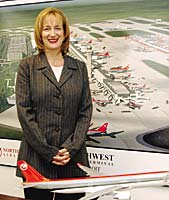 |
|
Andrea Fischer Newman
Photo by: Claire Duggan
|
“I ended up in aviation because of politics, and I got drawn into politics after graduating from the University of Michigan in 1979,” she says.
Her political career began at the Republican Convention in Detroit in July 1980, when she was offered a nonpaying job on the Reagan campaign. “I was pretty apolitical then, but I wanted to work, so I jumped at the opportunity,” she says. Shortly thereafter, she was offered a job on the Reagan-Bush campaign in Washington, D.C.
Newman followed her father’s footsteps by enrolling in GW Law School. She began classes in fall 1980 while continuing her volunteer work—on the campaign, then for the inaugural party, and on Vice President George Bush’s “advance” team, traveling worldwide and pre-arranging his trips.
“After finishing law school, I joined Patton Boggs, to be a ‘real lawyer,’ working in the government contracts department. After a year there, I was asked to join Vice President Bush’s staff as his scheduler. It was a tough decision, because I was really enjoying the law firm. But as it was explained to me, ‘You don’t turn down a job at the White House.”
Newman became Bush’s deputy assistant until 1986, took time off to have a daughter, then worked at the Pentagon for a year as special counsel to the assistant secretary of defense for acquisition and logistics. She returned briefly to Patton Boggs then moved to Detroit in 1989 to join Miller, Canfield, Paddock and Stone, working in the corporate section.
“I ended up working with companies that were negotiating all types of contracts with local and state governments. GW specializes in government contract law, which is a very unique area that I thoroughly enjoyed,” she says.
|
“People don’t leave aviation. The issues are myriad, dealing with everything, ERISA, labor, antitrust, contracts, torts, you name it, aviation is involved in it.”
— Andrea Fischer Newman, JD ’83, Northwest Airlines
|
Newman’s political activities also were rewarding. In 1989, John Engler asked her to help him run for governor of Michigan. She became an upaid volunteer finance director for his campaign. “The general wisdom in the state was that Engler would lose the election, but he won. Overnight I became one of the most popular lawyers in the firm.”
It was through political events that Newman met Northwest’s general counsel and began doing work for the airline. One early project was to help Northwest negotiate for its new terminal at the Detroit airport. “Being involved in that picked up on my government contracting and political skills. This was probably the most fun, getting to combine the two,” she says.
She started doing more outside work for Northwest. Around that time, she also was elected to the board of regents at the University of Michigan. “This created a tremendous conflict because the law firm also represented the university,” she says. “Northwest resolved the problem by asking me to come in house and work for them. It seemed like an incredible opportunity, and it has been since day one.”
A broad legal education has helped her deal with the many issues her job presents. “Legal skills help me deal with everything in my job—labor, in terms of the Railway Labor Act; environmental, in terms of noise issues; ERISA and how it impacts defined-benefit pension plans; insurance; and congressional involvement,” she explains. “In government affairs, you deal with so many lawyers in Congress and the various agencies that being a lawyer and having a legal background are very important.”
Newman’s office, in Washington, D.C., also handles international laws issues, dealing with companies, rules, and regulations worldwide. The United States has bilateral agreements country by country, regarding who can fly there, how many airlines, how many flights, etc., and Newman’s office is responsible for those areas, which require complex contracts work.
“Probably our biggest challenge right now involves Northwest’s upcoming pension contract and how the ERISA rules are written. The law was first passed in 1974, creating pension rules, and the federal statute requires companies with underfunded pension plans to fund the plans. But we currently have a situation where companies are least able to do that. Congressional efforts are underway to change the rules.
It’s that and other issues that keep her career interesting. “If you want to do something exciting, aviation is exciting,” she says. “People don’t leave aviation. The issues are myriad, dealing with everything–ERISA, labor, antitrust, contracts, torts–you name it, aviation is involved in it.”
Dee J. Kelly, LLB ’54
Kelly, Hart & Hallman
Fort Worth, Texas
Kelly’s firm, which he founded in 1979, focuses on civil litigation; corporate and securities; energy; environmental and administrative law; estate planning, probate and nonprofit organizations; labor and employment; real estate and finance; and tax.
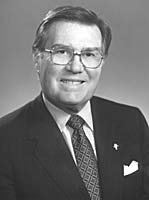 |
|
Dee J. Kelly
|
Kelly’s main segue into aviation came via business from American Airlines, which relocated its headquarters from New York City to Fort Worth in 1979. At the time, American was greatly expanding its routes across the United States and the Caribbean.
“American Airlines was moving fast, making record profits and buying aircraft. Our firm has done a lot of different types of legal work for the company,” Kelly says. “One of our most prominent cases was against the union in 1999. The union, by slowing the airline down, effectively paralyzed the airline’s schedule.”
Besides representing American, Kelly served on the board of directors for AMR Corp. (American’s parent) from 1983 through 2000. He was also on AMR’s travel-reservations subsidiary, SABRE Inc., from 1996 through 2000, as SABRE underwent an initial public offer and became a public company.
“While on American’s board, I gave my legal advice about matters when asked, but I wasn’t called to serve on the board because I was a lawyer. American had its own legal counsel to address the issues that were presented to the board. My job was to make decisions with the other directors about the company’s future,” Kelly explains.
“For most of the time I served, Robert Crandall headed the company, and it was a time of tremendous growth as American developed its hub systems. It was also a time of tremendous expenditures.”
Before Kelly went off the board in 2000, major events during his tenure included a reorganization to form AMR Corp., development of the global Oneworld Alliance with four other airlines, spin off of SABRE, and acquisition of two airlines.
During his career, Kelly was honored with several awards. He was inducted into the Horatio Alger Association of Distinguished Americans, selected as Fort Worth’s outstanding citizen in 1995; and received GW’s Distinguished Alumni Achievement Award in 2001. Kelly still serves on the boards of several entities, including GW Law School’s Board of Advisors.
For lawyers preparing for a career in aviation, Kelly advises, “It’s a very complicated and diversified business, and there’s hardly any area of study that wouldn’t be valuable. In many cases, airlines hire lawyers with good general backgrounds; the airline can teach them what they need to know about aviation.”
Patricia A. McNall, JD ’85
Assistant Chief Counsel
FAA Procurement Law Division
When McNall entered law school, she planned to go to the State Department to use her law degree and her bachelor’s and master’s degrees in international studies. But after finishing her first year at GW, she landed a summer job at the FAA as a legal intern.
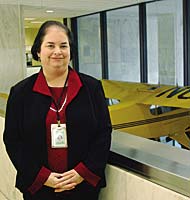 |
|
Patricia A. McNall
Photo by: Claire Duggan
|
“I was always interested in air and space law, and the FAA was doing international work, so the job sounded interesting. I found myself doing a lot of government contracts work and enjoyed it.”
By the time she graduated, she knew she wanted to stay. And now McNall is the FAA’s head government contracts lawyer. Her office is responsible for nationwide policy for FAA acquisitions.
McNall has held several posts at the FAA and has won several awards. Her most recent award came this year: the Federal Bar Association’s Transportation & Transportation Security Lawyer of the Year Award.
When it comes to procurement, the FAA has one of the government’s largest budgets. To do the required legal work, McNall has a staff of 11 attorneys and two support persons at FAA headquarters. FAA also has nine regional legal offices and two technical centers with procurement attorneys who do not report directly to her but call upon her for support when needed.
“At FAA we have integrated product teams that make acquisitions. They define the requirement for a product and continue with the product through its disposal and replacement. An attorney is assigned to each team to provide fairly continuous legal advice on any of the issues that can come up—fiscal law, contracts, environmental, patent, and other issues—associated with that acquisition. Our office also represents the agency in litigation involving all kinds of acquisition contracts,” McNall says.
|
“Aviation as a whole is a growth market. International legal work is going to continue to increase, because the world needs a seamless international aviation system.”
— Patricia A. McNall, JD ’85, FAA Procurement Law Division
|
Some major procurements McNall and her team legally reviewed include Y2K upgrades, explosive detection systems, ATC upgrades and Doppler weather radar systems. Likely the biggest project on McNall’s plate is acquisition for a new satellite-based ATC system, which will use the Global Positioning System to develop more efficient aircraft routing. The FAA is presently buying all the equipment, software, and services needed to do the job.
“For our department, this involves contract issues, patent and intellectual property issues and tons of international issues, because we are offering the system worldwide at no cost,” McNall adds.
“We are also doing a lot of security work in export control. When a foreign national comes to train at FAA or look at our technology, there are software packages we would like to distribute to them, but we have to consider export control laws first. Another example is when people are interested in getting ATC data; we have to resolve what kinds of security issues surround those requests.”
Her office also is part of a team that reviews the FAA’s response to attempts by people to hack into their computer systems. That work brings up issues of what is legally allowed when monitoring their own FAA employees, she says.
To aspiring aviation lawyers, McNall says, “Aviation as a whole is a growth market. International legal work is going to continue to increase, because the world needs a seamless international aviation system. Export control and security issues are other major growth areas.
“Government contracting is always needed, and GW has one of the best government-contracting programs around—I have a number of GW graduates on my staff. Tort law is another staple area. Antitrust issues are rising, with the airline industry involved in mergers, bankruptcies and restructuring. And given with new players in security—TSA and Homeland Security—some areas of law that people thought were settled, no longer are, translating into more legal work,” she says.
“Working for the government gives me the ability to work for something I really believe in. I can go to bed at night with a clear conscience and have a strong commitment to my role in seeing that planes fly safely.”
Ronald Brower, BA ’92, JD ’96
Hogan & Hartson
Washington, D.C.
Brower’s career preparation started at the age of 13, when he began attending college part-time. He graduated summa cum laude from GW with an economics degree in 1992, at the age of 19. Married that same year, Brower opted to attend GW’s night law school while working days.
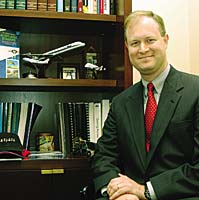 |
|
Ronald Brower
Photo by: Claire Duggan
|
“I really fell into aviation law. For me, it started with just a summer job at Verner, Liipfert, Bernhard, McPherson & Hand. At the end of the summer, they invited me to continue working there while I attended law school. Over the next four years, I was able to work for a number of the firm’s practice groups, so I had a lot of exposure to different areas of law before I finished school. When I graduated, Verner’s aviation group asked me to join them, and it was a practice area I found I really enjoyed,” Brower explains.
Brower’s work at Verner was heavily focused on the economic licensing of U.S. and foreign airline operations by DOT. Joining Hogan & Hartson in 1998 gave him an opportunity to continue this work while expanding his practice into regulatory issues governed by the FAA and other aviation-related transactional and litigation matters.
“In our practice here, we represent a wide variety of aviation clients, some large and some small, including U.S. and foreign airlines; corporate aircraft users; aircraft management companies; airport operators, tenants, and developers; manufacturers; aircraft leasing and financing organizations; national aviation trade associations; air tour operators; and foreign, state, and local governments,” he says.
One of the top issues on which Brower is working today is the regulation of international flights by privately owned business jet aircraft, including fractionally owned aircraft. “The United States. isn’t just the birthplace of aviation. It continues to be a focal point for innovation in the aviation industry. Some foreign governments, though, have not been as receptive to U.S. innovations in ways for individuals and companies to own and operate their own aircraft internationally. This is an area of regulation that is going to require a lot of attention by government and business officials here and abroad,” he says.
Airport access issues also have been receiving a lot of Brower’s attention recently. “To many of us in the industry, the sound of an aircraft flying by is almost like music. Unfortunately, the neighbors of many airports don’t share this sentiment. A number of airports are being pressured to find ways to reduce the number of aircraft operations that they accommodate, or the types of aircraft that they accommodate, to try to reduce perceived noise levels. We have been working with our clients to help ensure that such airport efforts do not unlawfully discriminate against any aircraft operators, and that the national airspace system is not harmed by a patchwork growth of different airport standards across the country.”
Brower encourages others to take an interest in aviation. He advises, “Get a broad-based legal education. You don’t need a specialized program of study, and you will find yourself better prepared to handle a wider range of matters if you avoid trying to specialize yourself too early. Also, I would encourage anyone who is interested in practicing aviation law to join the ABA’s Forum on Air & Space Law.”
Brower says he finds the mix of aviation issues in his practice both challenging and rewarding. “The aviation industry is a very dynamic industry. I definitely have no plans to change my area of law.”
Paul G. Greer, JD ’88
Regulatory Attorney
Airworthiness Law Branch
FAA Office of the Chief Counsel
Paul Greer’s career began after he graduated from the U.S. Military Academy at West Point in 1979. He served nine years as an Army intelligence officer, and while assigned to the Defense Intelligence Agency in Washington in 1983, Greer enrolled in GW Law’s night school.
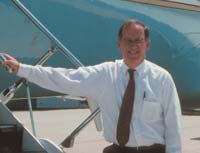 |
|
Paul G. Greer
|
“After earning my law degree, I did a branch transfer to join the Army Judge Advocate General’s Corps,” he says. “Stationed in Germany, I worked as chief of international law for an infantry division and a trial counsel for a brigade, doing military prosecutions. I also did a lot of legal assistance for troops, such as wills, powers of attorney, estate planning, personal finances and family matters.”
In 1991, Greer left the Army, but he is still a judge advocate in the U.S. Army Reserves. His first civilian job was with Phaneuf Associates, of Washington, D.C., an aviation consulting firm that did work for the FAA and nongovernmental clients, such as airlines and corporate flight departments.
“I joined Phaneuf because aviation always has been an avocation. I got my flight ratings privately and have commercial pilot, flight instructor, and helicopter pilot ratings, and a type rating in Cessna Citation jets. To lawyers coming into aviation, I’d recommend getting as much technical expertise as possible. Aviation is pretty complex, and the more you know about it, the better advice you can give,” he says.
In 1998, Greer joined the FAA in his current position to become more directly involved in public policy. In his job, he provides legal interpretations of FAA’s rulemaking for aircraft certification and flight standards, and reviews FAA internal and technical orders, bilateral agreements and advisory material. He also reviews petitions from aviation parties seeking exemptions from FAA regulations.
Greer’s biggest challenge is balancing a variety of competing interests—safety, security, resource constraints—to help FAA accomplish its goals.
“I primarily deal with the aviation regulatory side, working on how a regulation fits into our current set of regulations. We work on aircraft airworthiness, airmen certification, aircraft maintenance, and sometimes operational regulations,” Greer explains.
“Before FAA issues a rule, it publishes a notice of proposed rulemaking and puts it out for public comment. We draft the proposal, analyze the comments and put out the final rule. We work with the offices that write the federal aviation regulations, look at their drafts and conduct legal reviews.
“My law degree helps me ask the right questions about things the FAA’s technical people may not consider when they propose rules. We show them how what they want to do in one area might affect another area. It’s our job to consider how all the FAA’s rules intermesh. A big part of what we do is ‘what iffing’ a proposed rule,” Greer relates. “Other federal agencies also review FAA’s rules. Rulemaking is a long process, but if we are going to make changes, we need to take time to assure the changes are right.
Greer’s best advice to young attorneys is to do something they enjoy. “I’m fortunate because my hobby and avocation is my job. I flew before I could drive. If you want to get into this field, you have to love aviation. If you look up when an airplane passes overhead, then you are going to do well.”
Kathleen Kocks is an aviation writer based in New Orleans.
Back to top | Fall 2003 Table of Contents
|